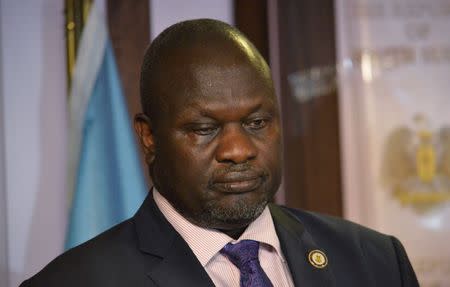UNHCR fears for safety of aide to South Sudan's Machar after deportation

JUBA (Reuters) - The United Nations voiced concern on Friday for the safety of a top aide to South Sudanese former vice president Riek Machar after he was extradited to his homeland from Kenya, where he had been granted refugee status. South Sudan's 2015 peace accord unravelled three months ago when forces loyal to President Salva Kiir and to estranged ex-deputy Machar battled each other on the streets of Juba for several days. Machar subsequently fled South Sudan and has since been replaced as vice president although he has exhorted his supporters to reorganise for an armed struggle. Machar's spokesman James Gatdet Dak also fled the country, finding sanctuary in Kenya, but police collected him from his Nairobi home on Wednesday and put him on a flight to South Sudan's capital Juba the next day, officials said. "He was deported from Nairobi by the Kenyan authorities and received by the South Sudanese government authorities,” presidential spokesman, Ateny Wek Ateny told Radio Tamazuj, a South Sudanese radio station based abroad. Ateny could not be reached by Reuters for clarification of Gatdek Dak's current status. A Kenyan government source confirmed Gatdet Dak's extradition but did not explain the legal grounds for it. The U.N. refugee agency UNHCR said it was "deeply concerned about the well-being" of Gatdek Dak and said his extradition appeared to violate his right to protection under the international refugee convention. UNHCR said it had unsuccessfully urged Kenyan authorities not to extradite Gatdet Dak. Kenya has taken part in African Union mediation to end the South Sudanese conflict and President Uhuru Kenyatta recently visited Juba for talks with Kiir. Amnesty International called Gatdek Dak's repatriation a "brazen and dangerous attack on refugee rights" and said he now faced a "grave risk of torture and other ill-treatment." (Reporting by Denis Dumo; writing by Elias Biryabarema; editing by Mark Heinrich)

